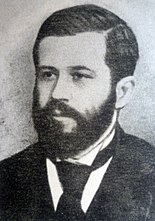Members
Gjerasim Qiriazi (1858–1894) attended a Greek school in his native Monastir and, with the assistance of his English teacher, the American missionary Jenney, studied at an American Bible college in Samokov, Bulgaria. After four years of training there, he was offered a job by the British and Foreign Bible Society, for whom he began working in Korça in 1883. He also began writing an Albanian grammar and is known to have preached in Albanian. On 12 November 1884, while traveling in the mountains southwest of Lake Ohrid, he was attacked by bandits and held for ransom for half a year. The narrative of his six-month ordeal was translated into English by J. W. Baird of Monastir as Captured by Brigands (London, 1902). The opening of the first officially recognized Albanian school in Korça in 1887 inspired him and his sisters Sevasti Qiriazi-Dako (1871–1949) and Parashqevi Qiriazi (1880–1970) to open a girls’ school. With the assistance of Naim Frashëri they received the appropriate authorizations in Istanbul and on 15 October 1891 opened the first Albanian girls’ school in Korça. The following summer, they moved the premises to a larger building to make room for more pupils. The Greek Orthodox hierarchy was fanatically opposed to the school from the start and went so far as to refuse to bury the son of one of its patrons. On 4 January 1894, Gjerasim Qiriazi died, aged 36, of the pleurisy he had contracted during his period of captivity. He was the author of poetry, songs, sketches, dialogues, and school textbooks. A selection of his writings was published by his younger brother Gjergj in the collection Hristomathi më katër pjesë (Chrestomathy in Four Parts; Sofia, 1902). [3] [4]
Gjergj Qiriazi (1868–1912), known in English as George Kyrias, attended a Greek school in his native Monastir and the American Bible college at Samokov. In 1908 he was a delegate at the Congress of Monastir. The politically active Gjergj Qiriazi was one of the founders of the Albanian language newspaper Bashkim’ i Kombit (Unity of the Nation) in 1909. In addition to his brother's chrestomathy, he published a collection of religious verse entitled Kënkë të shenjtëruara (Sacred Songs; Sofia, 1906). [4] [5]
Sevasti Qiriazi-Dako (1871–1949) studied at the prestigious Robert College in Istanbul with the help of Naim bey Frashëri, and played an active role in women's education. She was the first Albanian woman to study at this American institution, from which she graduated in June 1891. Immediately upon her return to Albania, she was instrumental in the founding of the Korça girls’ school. After World War I, this school was still known by the family name as the Kyrias School. Sevasti Qiriazi-Dako is said to have published a beginners’ grammar for elementary schools (Monastir, 1912) and edited a series of history texts. With her husband, journalist and writer Christo Anastas Dako, and her sister Parashqevi, she left for Romania and from there immigrated with them to the United States, where she collaborated on the fortnightly periodical Yll’ i mëngjezit (The Morning Star). [6] [7]
Parashqevi Qiriazi (1880–1970), also known as Paraskevi D. Kirias, also studied at Robert College in Istanbul, then returned to Albania to teach. In 1909, she published a speller for elementary schools. She later organized both children's education and night schools in southern Albania and helped set up the rudiments of a library system. In the United States, she helped found the Yll’ i mëngjezit (The Morning Star) society and published the illustrated periodical of the same name, issued in Boston from 1917 to 1920. Parashqevi Qiriazi also took part in the Paris Peace Conference of 1919 as a representative of the Albanian American community. [4] [8] [9] [10] [11]
The Kyrias (Qiriazi) family name is widely respected in all Albanian populated territories and many institution bear their name. March 7 is the official Teachers' Day in Albania, in remembrance of the Qiriazi family school opening of 1891.
This page is based on this
Wikipedia article Text is available under the
CC BY-SA 4.0 license; additional terms may apply.
Images, videos and audio are available under their respective licenses.



